Genre: Heist/Thriller/Period/Romance
Premise: Set in 1962, a male and female jewel thief must put a team together to take down a sinister German business mogul who made his untold riches during World War 2.
About: This newest version of Oceans is being spearheaded by Margot Robbie, who is said to be the creative leader of the direction and feel of the project. She took it to director Jay Roach. And, I’m assuming, Robbie chummed up with Gosling on Barbie, where she asked him to be in Oceans as well. Robbie says she was more interested in the romantic aspects of the story than the heist stuff. I’ve reviewed one other script from newcomer Carrie Solomon, a Black List script titled, “My Boyfriend’s Wedding.” I found that script to be a bit messy.
Writer: Carrie Solomon
Details: A very reader-unfriendly 129 pages

Margot Robbie and Ryan Gosling.
Are they the new Audrey Hepburn and Carey Grant?
Cause after Barbie, they’re doing this!
It’s a smart play to make an Oceans movie right now. The number of genres that have the box office potential to risk a theatrical release is shrinking by the month. But this is one of the remaining few that could work – the sexy heist genre.
It’s a simple but powerful formula. Get a couple of hot movie stars, dress them up to look even hotter, write a script that’s dripping with sexual tension, and VOILA. A hundred fifty million domestic buckaroos.
UNLESS…
Unless the script is bad. Let’s (hopefully) learn that that’s not the case.
It’s 1962. 30 year-old Elsie Brunner, one of the most beautiful women in the world, is at a mansion party trying to steal some really expensive earrings. Once she finds the bedroom where the safe is, she sees 37 year-old safe-cracker Jack Mason. Jack is one of the most handsome men in the world. He also wants these earrings.
After Jack steals the earrings, the two of them (who instantly hate each other) must pretend to be a couple when others from the party find them. They use this ruse to escape, flirt, separate, and for Jack to sadly realize, afterwards, that Ellie took the earrings from him.
A few months later they’re in Monte Carlo because some super-baron named Aristotle Onassis has a jewel worth more than 50 Mona Lisas. It’s here where we learn about Jack’s dark soldier past and his experiences in the war, where the evil Aristotle wiped out his entire team!
That’s the real reason Jack wants the diamond – to get back at him! Elsie wants to join him, not because she has a personal beef with Aristotle: “Because I’m all out of mercy for pathetic men with no concern for what’s right. Their breed has wreaked enough havoc.” Put that through the 2023 movie dialogue translator and you get: TOXIC MASCULINITY
Which means getting the diamond isn’t enough. They want to destroy this man as well. Aristotle wants to buy the Hotel de Paris to stabilize his shaky financial portfolio. But he currently doesn’t have enough money. His plan to remedy this? He’s rigged the Monaco Grand Prix so that his car will win. He’ll bet untold gobs of money on his car, win a small fortune, and use that to buy the Hotel.
Therefore, if they can stop him from winning the race AND steal his diamond, they’ll basically bankrupt him and ruin his life. Of course, if they’re going to pull this off, they need a team. To do so, they’ve decided to use a half-retro Oceans approach (all men) a half-modern approach (all women) and come up with the first Oceans team that has an equal amount of men and women. And we’re off! Oh wait, that’s horse racing. “Ready, Set, GO!”

Let’s start with the good.
I love the setting here. I knew nothing about this script when I opened it. So I wondered, “How are they going to make this different? Why do I want to watch another group of people who like to make a lot of jokey quips with one another try and steal something?” I just didn’t see anything they could do that would make the concept feel fresh.
But the second I learned the script was going to take place in Monte Carlo in 1962, I started reading with a lot more interest. It goes to show that SETTING ALONE can really freshen up a stale concept. Especially with these franchises, since they all feel the same. I remember they did the same thing with X-Men: First Class, and that ended up being one of my favorite superhero movies.
I’ve also realized that movies set in the 1960s give your characters backstory access to World War 2. That war has the potential to come up with some of the most interesting backstories imaginable. So there’s a lot to play with. And they do that here with both Jack and Aristotle.
Although I’m all for peace on earth, the fact that there hasn’t been a big war in the last 75 years has left a lot of writers with nothing to work with on the backstory side. Sure, you can use the Afghanistan War but it doesn’t exactly hold the same weight as a character who participated in the battle for Iwo Jima.
That rich texture can shape characters in really interesting ways and this script is proof of that. I found Jack to be quite generic for the first 25 pages. But the second we learn about his World War 2 roots, along with his connection to Aristotle, I saw him in a whole new light.
Also, a rule I have with heist scripts is that the heist needs to have something in it that isn’t just about money. Money is boring in these types of movies. Who really cares if our heroes score 5 million dollars? Or 50 million? Or 100 million? It’s just monopoly money to a moviegoer. So you want to be creative – find other ways to make the heist fun.
Adding a car race, of all things, is something I haven’t seen in a heist film before. You have to win a race to complete the heist? Count me in!
But I didn’t enjoy everything here. If I have to read another sexy heist team-up where the opening scene has the guy steal something, only for the guy and the girl to go their separate ways afterwards, and the guy realizes that the girl stole the object from him, usually during a kiss, I’m going to sauté myself at 450 degrees in an air-fryer. I’m not exaggerating when I say that I’ve read this scene in 75 different scripts.
C’mon. This is your first scene. You have to show us why you’re a real writer and not just another movie fan who got into screenwriting. Give us something different. Even if it’s just the guy discreetly stealing from the girl! Why is it, in all 75 of these scripts, that the girl steals from the guy? It just shows how unoriginal we all are. Or how lazy we are. Dig a little deeper. Try a little harder. Declare to yourself, “I’m going to give the world an opening scene that they’ve never seen before and I’m going to rewrite it 100 times if I have to to get there.”
Luckily, after that opening, the writing got a lot better. I don’t remember the last time the setting of a movie did so much of the heavy lifting for a screenplay. This 1962 Monte Carlo setting turns another run-of-the-mil heist film into something potentially special.
I’ve never been the biggest fan of the Ocean’s movies, especially as they’ve only gotten worse with each new entry. But I honestly think this could be the best of the series. It may not have the charm and star power of that original remake (what a funny phrase to type), but it has a way more interesting plot, a more creative heist, and the romanticism of the 1960s at its back. This movie could be the real deal.
[ ] What the hell did I just read?
[ ] wasn’t for me
[xx] worth the read
[ ] impressive
[ ] genius
What I learned: From this point on, when I am imagining a potential project, I’m going to imagine what the concept looks like in the 1990s, 1980s, 70s, 60s, 50s, 40s, to see if any of those options is better. Take, for example, the logline we were kicking around yesterday: “A disgraced airline pilot turned plane crash investigator is hired by a mysterious outfit to investigate a recent crash in a remote part of Siberia, only to learn, when he gets there, that the crashed vehicle is alien.” Imagine that scenario set in 1957. Or 1943. Or 1969. Each of those movies is completely different.

For one day only, we’ll be talking about the shocking interview UFO whistleblower David Grusch just did!
First of all, I promise I’ll tie this all into screenwriting by the end of the post. But before we get to that, I want to talk about these latest UFO allegations that have hit the news in detail because I know a lot of people don’t believe in UFOs or aliens. I’m not here to convince you that they exist. But I do want to make the case that this latest allegation, which claims that the U.S. is in possession of at least a dozen non-human craft, is a bigger deal than what we’ve seen in the past.
To be fair, it does feel like every five years, some big UFO news comes out, and us UFO fanatics are excited because we’re finally going to get the answers we’re looking for, only for no evidence to emerge, the government to poo-poo the sighting, and the media to quickly move on.
There was the release of these “Go Fast” and “Gimbal” UFO videos several years back, both of which were confirmed by the government to be UFOs. However, because the videos are so shoddy, it’s not convincing enough to be confirmed as the real thing.
You had the Stephensville, Texas sightings in 2008. Many people saying they saw a giant craft. You had the famous Phoenix Lights case, with an enormous craft that hovered over Phoenix in 1997, which the mayor, Fife Symington, would later admit he saw and believed was an alien craft.
Before Phoenix, you had the controversial Bob Lazar story, where Lazar said that he worked at Area 51 where they had, in their possession, alien craft, which they were trying to back-engineer. Lazar is the one who put Area 51 on the map for the general populace.
You had the 1980s Hudson Valley flap, with UFOs ripping through the area over a series of several years and numerous people claiming they’d seen these ships. Not just lights. Actual ships. And if you go back even further, you have the grandaddy of them all, Roswell.
Now, the reason Roswell (as well as Bob Lazar’s story) is so significant today is because this newest news has a whistleblower named David Grusch, who is verified to have a high level ranking inside the government that allows him access to 200 classified programs, and by talking to a lot of the high-ranking officers in these circles, he’s found that there’s a secret program that has possession of a dozen (or more) UFOs which they are trying to back-engineer.
Some of them have crashed. Some of them have been abandoned. But they’ve been able to get a new one once every 10 years or so. Funny enough, the first retrieved UFO was not at Roswell, but actually in Italy in 1933. Mussolini even talked about it with the Pope (documented in the linked article). The Pope fell out with Mussolini during the war and would eventually reveal the UFO to the U.S., which is how the US became aware of it and would end up snatching it up after the war.
Now all of this sounds crazy to people outside of the UFO community. But those who, like me, have been following this topic forever, know that there’s been a ton of smoke around these retrieved craft forever now. It’s almost an open secret at this point.
The reason Grusch’s claim is different from all the UFO stories from the past is because he’s a very well-respected member of the government who a lot of people vouch for. Also, the media has meticulously verified every single job position he claims to have had within the government.
One of the ways that the government and media were so easily able to dismiss Bob Lazar’s story (which is now starting to look true – the Roswell craft is one of the craft that Grusch says the US has in their possession) is that Lazar couldn’t prove that he worked for the government. David Grusch has enough documented proof of his employment to fill a warehouse.
Another major factor here is that the US has just recently put into practice a whistleblower law that allows government officials to finally talk about this stuff without going to prison. This is why Grusch has come forward. And it’s why other whistleblowers with even more information are going to come forward as well in the coming months.
I’m aware of what the skeptics are thinking.
Okay, great. But, where’s the evidence? Where are the pictures? Where is the video? Why is every picture that’s ever been taken of a UFO blurry?

This is a complicated question so I want to tackle it with a certain level of nuance. I’m 90% sure UFOs are real and aliens are here. That 10% that’s holding me back are the questions I just asked above. It definitely feels convenient that all the pictures that have ever been taken of UFOs are just out of reach.
When I get too deep into this stuff, I think about the topic of ghosts. I don’t believe in ghosts. When I see all these TV shows and videos and pictures that purport to show ghosts, I’m aggressively dismissive. Yet, for some reason, I don’t put as much emphasis on the burden of proof for UFOs as I do ghosts. I think it’s because I just believe, in my heart, that UFOs are real. But clearly I’m not treating the two topics equally, which implies that I’m looking at the UFO topic through belief-colored glasses.
But getting back to the photographic evidence question. Part of this answer is obvious. UFOs are almost always seen at night. And you’re never going to get a good picture of anything at night that’s more than 200 feet above you. Try and take a picture of a helicopter flying overhead at night. It’s blurry. It’s tiny. It’s unclear. At the very least, you’re not going to get a sharp enough image of a craft that’s going to convince anyone that it’s a UFO.
With that said, there are a lot of sightings that have happened during the day. Why haven’t any of these supposed sightings resulted in pictures? I want you to listen to a phone call of a guy in 1967 calling in to what was, at the time, a national UFO hotline that was set up for anyone wanting to report a UFO sighting.
This guy calls and frantically talks for 15 minutes about these UFO sightings that he had over the course of three days. And the operator gets noticeably agitated at the end and says, “Well, wait a minute here. You didn’t take ONE SINGLE picture in all that time?” At one point, there was a giant craft directly over the caller’s house in the middle of the day. Why not take a picture then?
To the caller’s credit, he shares the operator’s frustration. He wished he would’ve taken pictures! He seems almost confused as to why he didn’t get pictures. And I’ve found this to be a very common response from the thousands of people who have had these same sightings. When they’re asked about pictures, they seem baffled or confused. They don’t seem to know why they didn’t take pictures.
Now, if you think every one of these 30,000 – 50,000 people who had sightings are lying about what they saw and that’s why they don’t have pictures, that’s fine. Just listening to the authenticity in this man’s story alone, I’m convinced he saw the things he said he saw. But I understand if that’s where the conversation ends for you. I would respond the same way if this was a post about ghosts.
But I personally think that something’s stopping these people from taking the picture – or thinking to take the picture. Many of these stories about people getting up close to these craft or actually seeing the aliens, talk about being frozen, being unable to move. So these things seem to have some sort of control over you. Could they be preventing people from taking these pictures? I know it sounds crazy but if these things are 100 or 500 or 1000 years ahead of us technologically, that’d probably be something fairly easy to do.
What I’m hoping is going to happen with this latest round of whistleblowers is that it’s going to cause a wave. And, unlike in the past, the government and the media aren’t going to be able to sweep that wave under the rug. There hasn’t yet been a gigantic UFO story in the age of big social media. Maybe the uproar is so intense and so constant that they’re going to have to finally give us something. I don’t think they’ll give us everything. But I think they’ll give us something.
Now, I promised to tie this back into screenwriting. So here we go. I thought it would be fun for the Scriptshadow community to come up with the ultimate alien or UFO movie concept. That concept would then be for everyone here. Assuming we made it good enough that people would actually want to write a movie from it, it would be an “open source” movie concept. Anyone could take it and run.
The way we do this is I’ll give you a starting point concept, which I’ve already shared on the site before, and we can build on it. OR, you guys could come up with something better and we could build off that concept. I have no ego here. It’s been a long time since anyone has come up with a cool UFO or alien concept. So I just want to find one!
I will gladly jump into the comments and participate in helping guide our “ultimate alien idea” into the perfect alien/ufo concept. None of us should have any ego here. Tell someone if an idea isn’t any good. But also try and make it better. Or come up with a better concept yourself. Upvote those who are coming up with the best concepts so we know which loglines to focus our efforts on.
I’ve found that creating a concept is a lot easier (and more fun) with a bunch of people. So, here’s my original idea… which, ironically, after today, is starting to look like non-fiction. Improve on it. Tear it apart. Use it as inspiration to come up with a cooler idea. Anything goes!
A disgraced airline pilot turned plane crash investigator is hired by a mysterious outfit to investigate a recent crash in a remote part of Siberia, only to learn, when he gets there, that the crashed vehicle is alien.
While the box office helps screenwriters keep track of industry trends, which helps inform them when it comes time to write something, the majority of that data is useless. To screenwriters, I mean. There isn’t anything the average screenwriter can learn from Super Mario Brothers making a billion dollars. All movies in the top 10 live in Studio IP La-La Land, a destination reserved exclusively for the titans of the industry.
In order to learn something from the box office as a screenwriter, you want to track ORIGINAL projects. Projects that you could’ve written yourself, had you the foresight to do so. These are the projects that savvy screenwriters should be emulating and inspired by, as these are the scripts from screenwriters that actually get made.
Today I’m going to list the top 10 original projects, ranked by worldwide box office take, and tell you what you can learn from each of them. I’m sure there will be some comments about the underwhelming box office take of some of these films. But let’s keep things in perspective. M3GAN, the number one original movie of the year, cost 1/20th the budget of Super Mario Brothers, the number one overall movie of the year. When you take that into consideration, you realize these box office performances are a lot better than they first look.

M3GAN
Genre: Horror
Domestic: 95 million
Worldwide: 176 million
Lesson: I confess I did not see M3GAN’s success coming. I thought the living doll horror story had been done to death (see what I did there?). They couldn’t even get a better known doll franchise, Child’s Play, to drive ticket sales. Why would I think rando M3GAN would be able to? But if there’s anything M3GAN’S success reminds us, it’s that horror is the go-to genre if you’re a spec screenwriter who actually wants to make money. It honestly can’t be beat. And looking back at previously successful horror templates is a great starting point for coming up with an idea that gets buyers salivating.
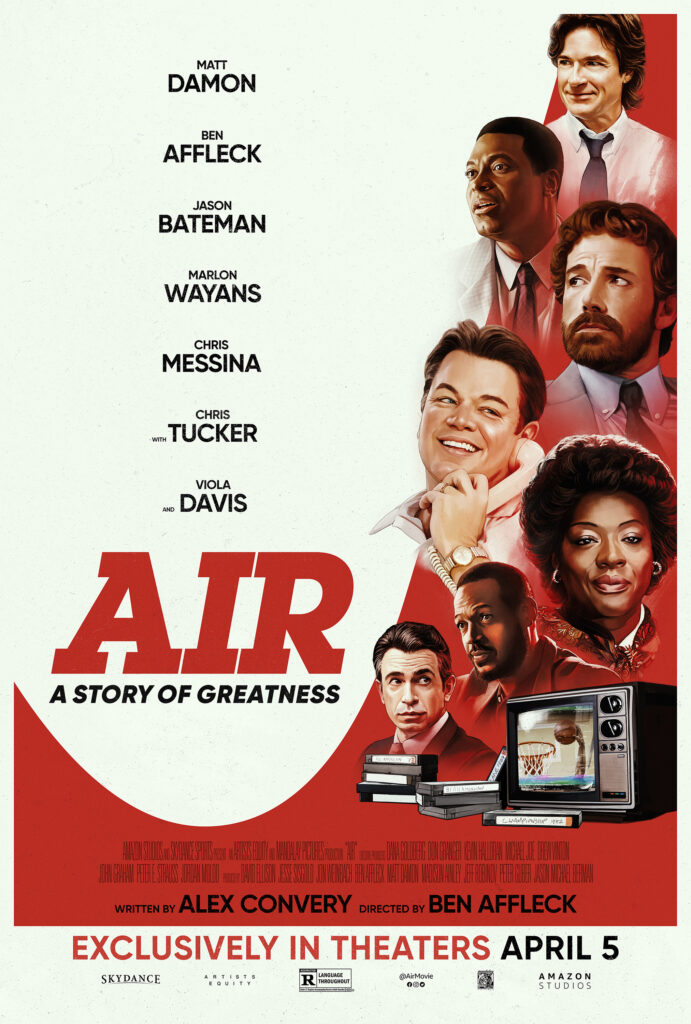
AIR
Genre: Sports Drama
Domestic: 52 million
Worldwide: 90 million
Lesson: Yet another savvy business idea is to mine true sports stories for concepts. They usually do well. Weirdly, they all do well on the Black List (I guess because all those assistants are big sports fans), further improving the chances of them getting purchased. Air was a departure from the usual formula, though, since it was less about the on-field stuff and more about what happens behind the curtain. The hack the writers are using here is that they know a lot of actors love sports. And they know those same actors are either too old or not in good enough shape to play professional athletes. But anybody can play a schlub in a suit. If you make that schlub talk a lot, you’re going to find a big actor who wants to play him. That big actor is the start of a flashy package that’s going to make sure your movie gets a big marketing push.
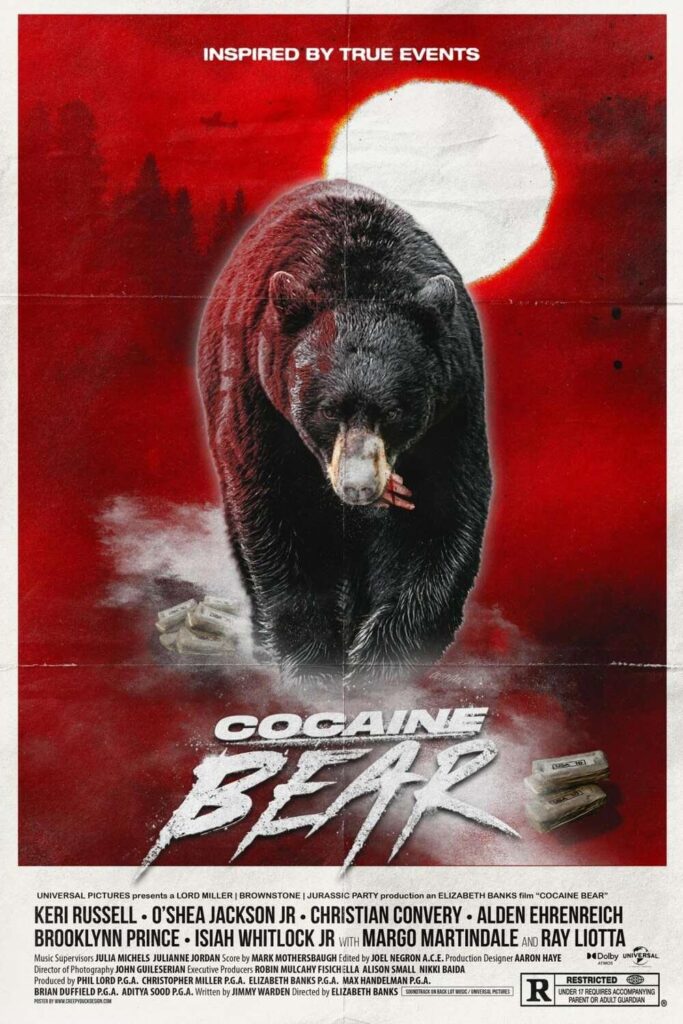
COCAINE BEAR
Genre: Comedy/Horror
Domestic: 64 million
Worldwide: 87 million
Lesson: Cocaine Bear is an example of a low-key growing trend in concept creation: viral concepts. These are concepts that either already went viral on social media (“Zola”) or the ideas are so wacky, the producers are banking on the fact that the movie itself will go viral, which achieves that all-important awareness, and also saves some money on the back end of the marketing budget. That was the plan here, although it’s difficult to tell if it was successful or not. Cocaine Bear landed in that monetary zone where you can’t call it a success or a failure. Which means even these newer flashier ways to construct concepts are susceptible to the same roll of the roulette wheel that movies have had to deal with since day 1 of the business: You never know what’s going to click with audiences.
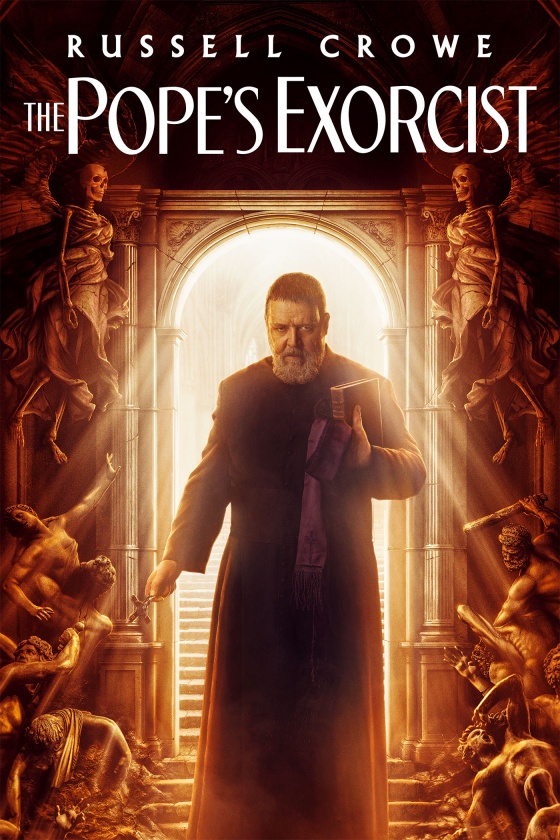
THE POPE’S EXORCIST
Genre: Horror
Domestic: 20 million
Worldwide: 74 million
Lesson: This was based on a book but I included it because it’s still an idea any writer could’ve come up with. You don’t even need the book to write about it, since it’s based on a real person. One of the most dependable horror specs you can write is an exorcist script. If I had any interest in exorcisms, I would be writing one of these every month. How dependable is the genre? Well, the script doesn’t really have a hook. I guess it’s kind of cool that the exorcist works directly for the Pope. But it’s not like the Pope is possessed. That would be a hook. Our exorcist still exorcises normal people, like every other exorcist. In other words, even without a hook, this movie made 74 million worldwide, and that’s all because of one word: EXORCIST.
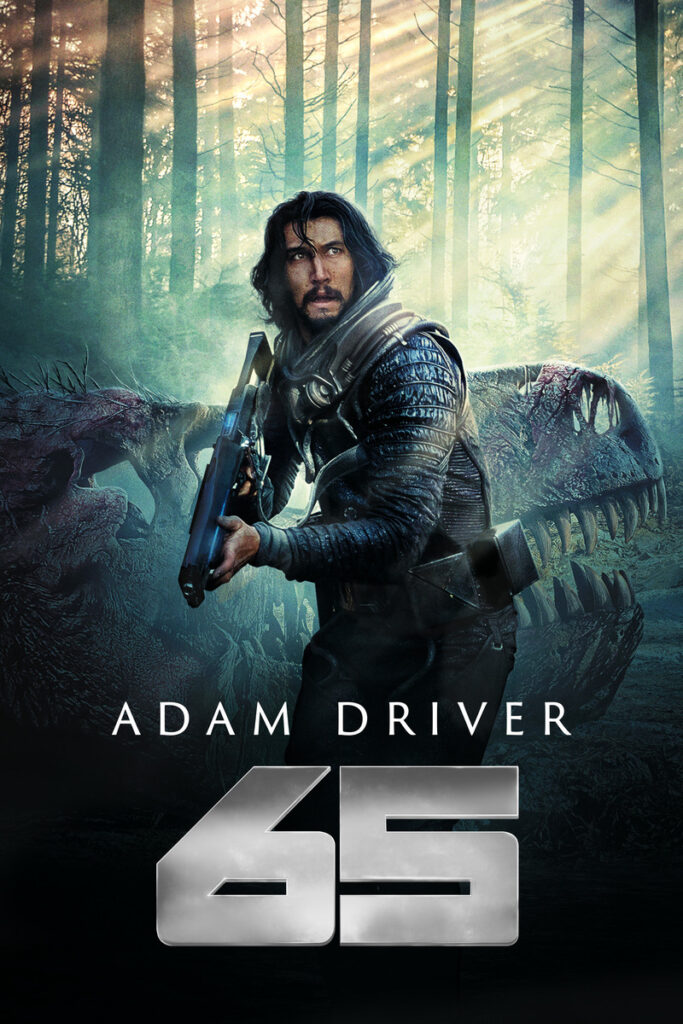
65
Genre: Sci-fi
Domestic: 32 million
Worldwide: 60 million
Lesson: When people think of this film, they think, “Loser.” But it’s actually a winner. Every movie on this list is a winner because it’s an original idea that got made. Which is what most of you are trying to accomplish. 65 was actually a good idea. A couple of people crash land on earth during the dinosaur era just hours before the famous dinosaur-destroying asteroid arrives. Unfortunately, it made a couple of critical creative mistakes that tanked its RT score (main characters were, inexplicably, aliens and the tone was too dour). Since original movies are more dependent on good reviews than studio-backed mega-franchises, 65 didn’t survive its weak critical reception. To really take advantage of mid-budget sci-fi, you have to keep things here on earth and in the present. District 9, Arrival, and the upcoming The Creator. I still contend that 65 was a cool idea. But mass audiences tend not to like this story setup for some reason (they rejected “After Earth” as well).
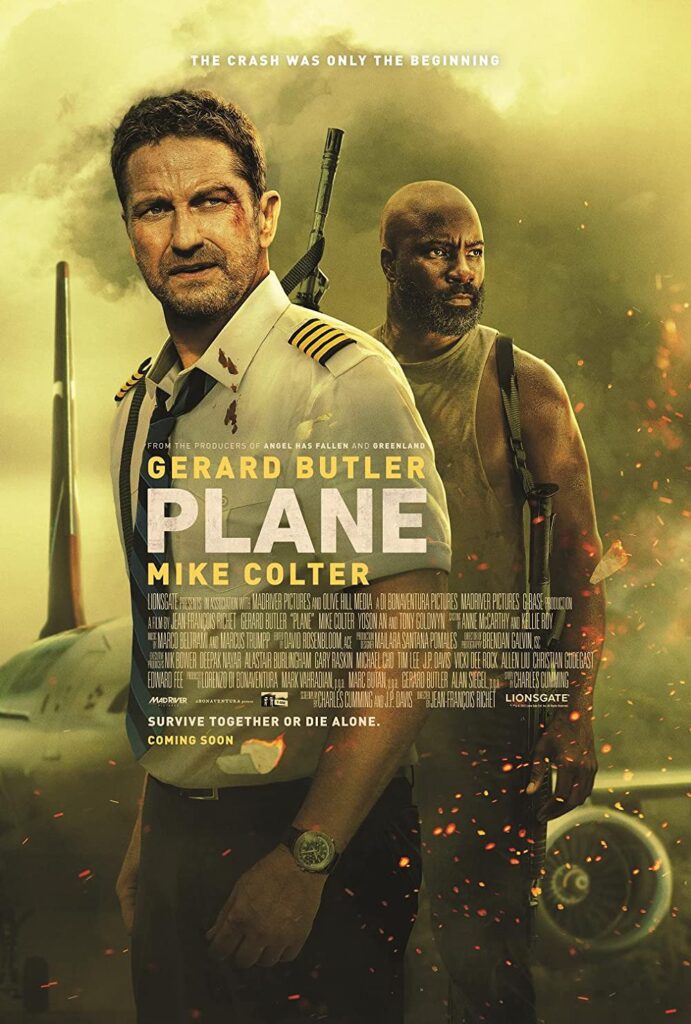
PLANE
Genre: Action/Thriller
Domestic: 32 million
Worldwide: 52 million
Lesson: The great thing about these movies is that they always get made. These Thriller-Action B-movies might as well be printed on the same documents that authorize the financing transactions for production because that’s how dependable they are. With that said, you are going after the same group of actors here (Gerard Butler, Liam Neeson, Jason Statham, etc.) and it DOES help if you can give them anything unique. It’s very common for them to say, “I already played this part.” It’s why Statham got so excited to do The Beekeper. Sure, in the end, money talks. Neeson has done the same role for the last 20 movies. But what I’m saying is, you gain yourself a little bit of an edge if you not only come to the actor with an offer, but come to them with an offer and a role they haven’t gotten to play yet. Gerard Butler had not played a pilot yet. And that was all he needed.
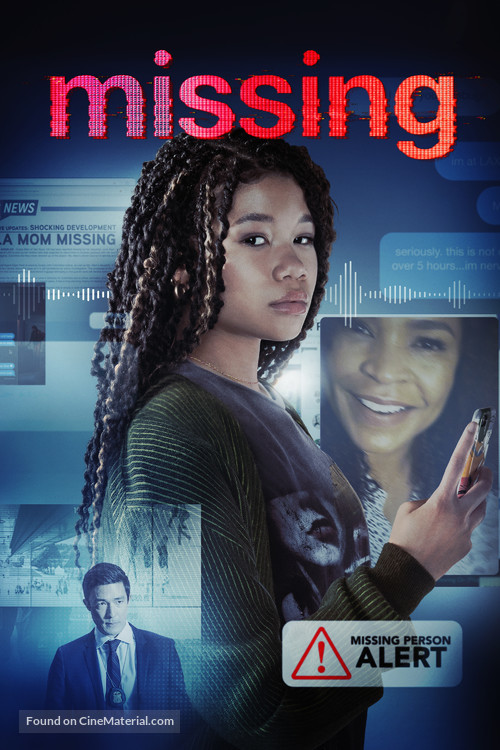
MISSING
Genre: Thriller
Domestic: 32 million
Worldwide: 49 million
Lesson: Timur Bekmambetov is THE GUY for these computer-based movies. I know a writer who’s writing one for him right now. And since they’re so cheap to make, I see Bekmambetov’s production company continuing to spit them out until they squeeze every dollar out of the sub-genre. Just make sure that you keep the story moving, which Missing does an AMAZING job of. It isn’t just a thriller in name. It’s thrills every second. Remember that the main character is sitting down the whole movie (or most of it). Which is why you want the story to have extreme urgency and stakes. Cause if someone is sitting down the whole movie in front of a computer and their goal is weak and they have as long as they want to achieve that goal? That’s a script disaster waiting to happen.
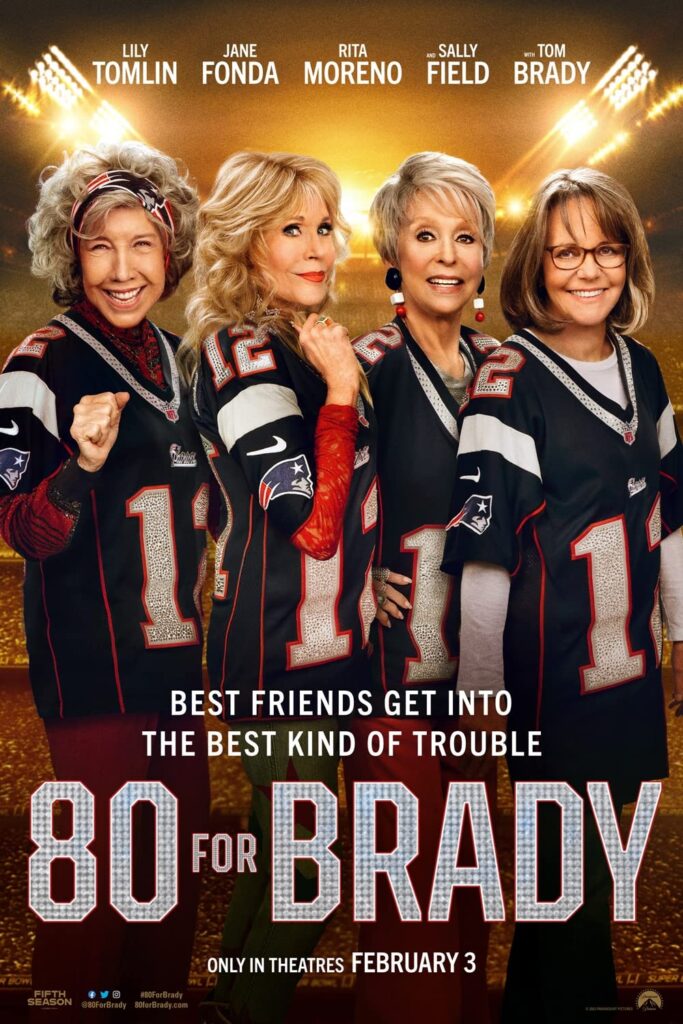
80 FOR BRADY
Genre: Comedy
Domestic: 40 million
Worldwide: 40 million
Lesson: It may not be my thing. It’s probably not your thing either. But the 65+ female demographic has been known to come out for these movies. The formula right now is comedy + several older women. But that could change and be centered around 2 older women, or even 1, if she’s interesting enough. If you have a really good comedy idea for the older female demographic, it may be worth writing it just because this is one of the least competitive sub-genres out there. Very few writers are writing them. So if you had something good, you could sell a script.
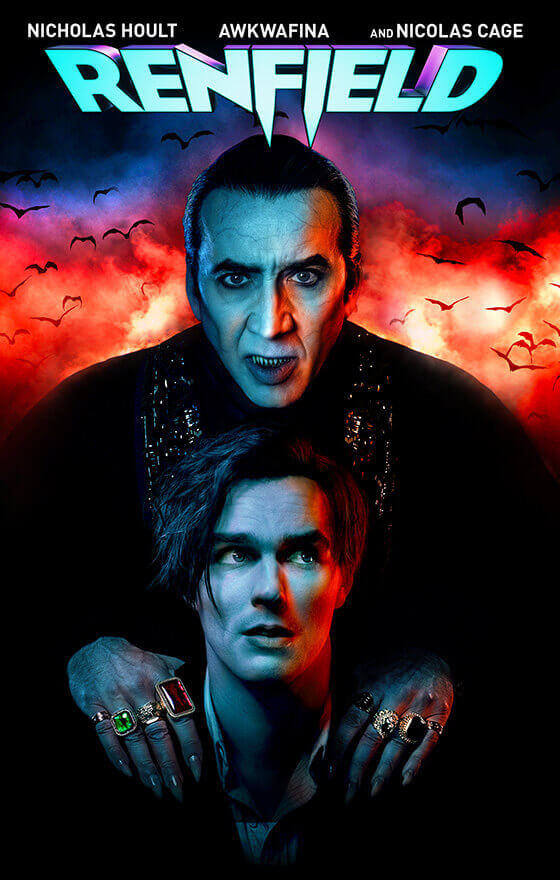
RENFIELD
Genre: Comedy/Horror
Domestic: 17 million
Worldwide: 25 million
Lesson: What I’ve found with horror comedies is that there’s a segment of writers who love to write them and a segment of readers who love to read them. But when you get to the actual theater, not a lot of people like to come to them. The target demo for this genre combo is usually people bored at the end of the weekend who just want to throw on something mindless. Which is why this movie bombed. Plus, I think it was too weird. The comedy angle was odd – that Dracula’s assistant had powers of his own. It didn’t really make sense. That’s script suicide right there – when your main character’s unclear.
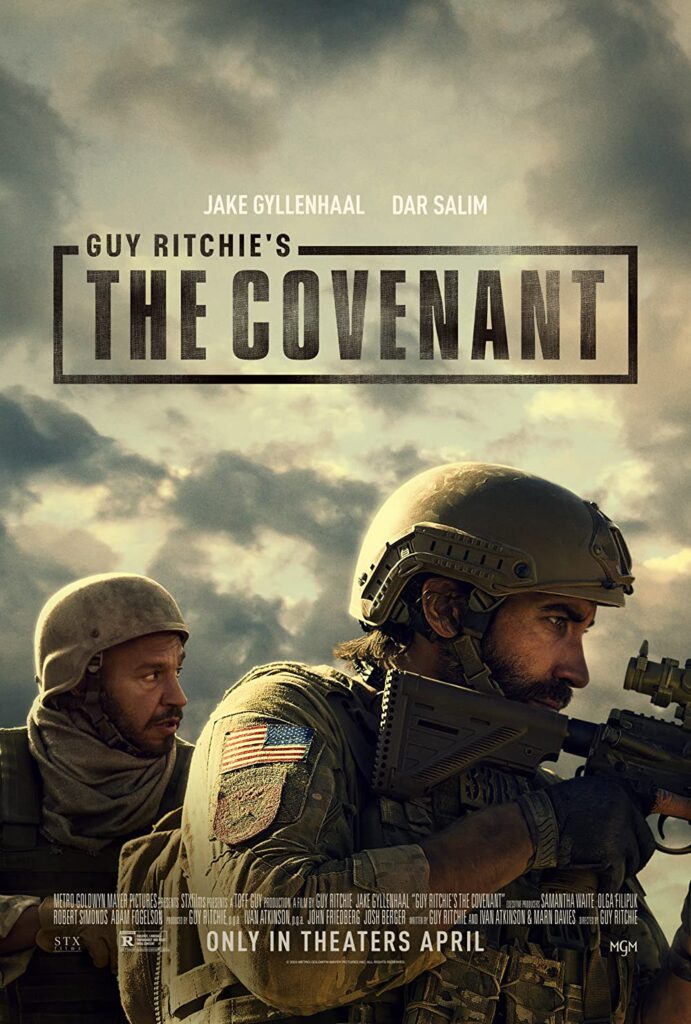
THE COVENANT
Genre: War/Action
Domestic: 16 million
Worldwide: 18 million
Lesson: These movies tend to play well to conservative audiences. This one was about a guy carrying another guy across the battlefield for a long distance. But it’s a tough genre to hit the bullseye with. American Sniper showed what was possible at the box office. Lone Survivor did well. Hacksaw Ridge did solid. So you would think this would’ve done better. What was the difference? Out of these four films, only The Covenant was not based on a true story. The thing with these conservative-leaning war stories is that the Rust Belt idolizes these soldiers. They’ve been celebrating them long before anyone made a movie about them. You could say that they’re conservative IP. So I think that’s the trick if you’re going to write one of these. Making it completely fiction, especially with such a weak hook (carrying a guy across a battlefield), was the stake in this movie’s box office heart.
Get a Script Consultation With Carson for $50 OFF! – In addition to logline consultations (just $25!), I do full screenplay consultations, pilot script consultations, outline consultations, first act consultations. Anything you need help with, I can help! If you mention this article anytime this week, I will give you 50 dollars off a feature or pilot consultation. :). E-mail me at carsonreeves1@gmail.com
Genre: Horror/Action
Premise: A lonely bounty hunter trying to improve his life goes around LA killing secret monsters hiding inside human bodies. His job gets a lot more complicated when he’s forced to team up with his first partner.
About: This one sold for a bunch of money in a competitive bidding war that ultimately went to Netflix. David F. Sandberg is directing.
Writers: Gregory Weidman and Geoff Tock
Details: 92 pages
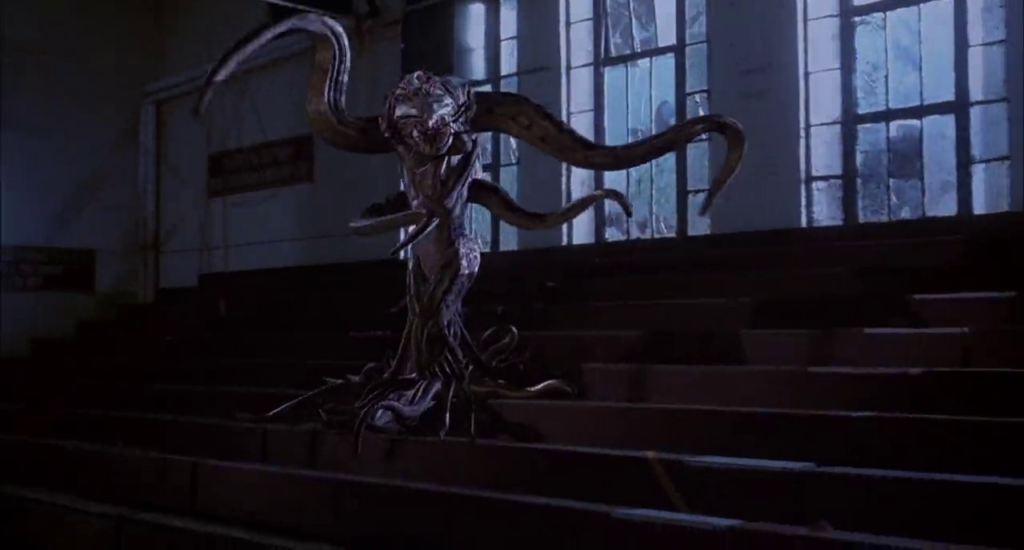
I’ll be honest.
All I care about right now is aliens. I’ve been following this story about the U.S. having possession of crashed alien ships for the last 24 hours. If it was up to me, I would spend the next ten Scriptshadow posts talking about it. I actually looked for an alien ship outside my place this morning. So far, one hasn’t stopped by.
But I understand not everybody here is as enlightened as I am and that you don’t care that the aliens are coming (or have they always been here??). So I’m going to restrain myself from turning this into UFO Shadow. FOR NOW.
The cool thing is that we have a script worthy of its own headlines today. “Below” resulted in a serious bidding war and sale. It’s going to be directed by David F. Sandberg. I’ve met Sandberg two times now, once on the set of Lights Out and another time randomly in the aisle of a supermarket. He’s an excessively sweet guy. He just emanates positive energy and we don’t have enough of that in this town.
So I’m really rooting for this script.
“Our Man” is our hero. He lives alone in LA in a tiny apartment, listens to self-help podcasts all day long that preach things like, “You can’t depend on anyone. Only you can move up in the world by your own actions.”
Which is exactly what Our Man is trying to do. He’s a bounty hunter of sorts. He gets text messages every week for a new job. “5% above normal rate” they say, then gives him a location. Off he goes and kills these monsters, tentacled creatures hiding inside human bodies called “dregs.” Afterwards, he takes the dreg skull to a buyer who pays him cash.
Our Man’s dream is to open his own karaoke bar. And he only needs a few more jobs to start that dream. But when he gets a text for his next job, it’s accompanied by, “Now you have a partner.” Our Man tries to ignore it, but after doing the job, his new parter, a woman slightly older than him named “Boxer,” shows up.
Boxer attempts to befriend Our Man, who does everything within his power to stay alone. He doesn’t do the whole “connect with people” thing. But she keeps chipping away at him and soon they’re drinking beers and eating food truck tacos together. To his surprise, Our Man likes Boxer.
As they go over the uptick in jobs lately, Boxer theorizes that something big is about to happen. And when they catch a dreg kidnapping a person instead of killing him, like they usually do, she knows something is up. That’s when they get a shocking text. Their next job is 700%(!!!) above normal rate. Could it be the Queen Bee? Our Man doesn’t want to find out. But they don’t have a choice. And off they go.
There are a couple of big things that come to mind when you read “Below.” The first is that this is the third version of this story that’s been on Netflix. People hunting down supernatural creatures in Los Angeles. You had Bright. You had Day Shift. And now you have Below.
That surprises me. But maybe there’s an executive at Netflix who just loves these types of movies. I get it. If I was an exec, every other movie I greenlit would have aliens. But it did catch my eye because you’re always looking for something fresh. So I was surprised that this was so similar to other stuff on the streamer.
The other big thing going on in this script is the Walter Hill writing style. That’s where you write sentences vertically instead of one after the other. It’s tough to endure if you read a lot of scripts because you’re used to getting that line in between every paragraph. And here, you don’t get that breather. So I’m not a fan of it. But I suppose if you don’t read a lot of scripts, it doesn’t disrupt your reading pattern much.
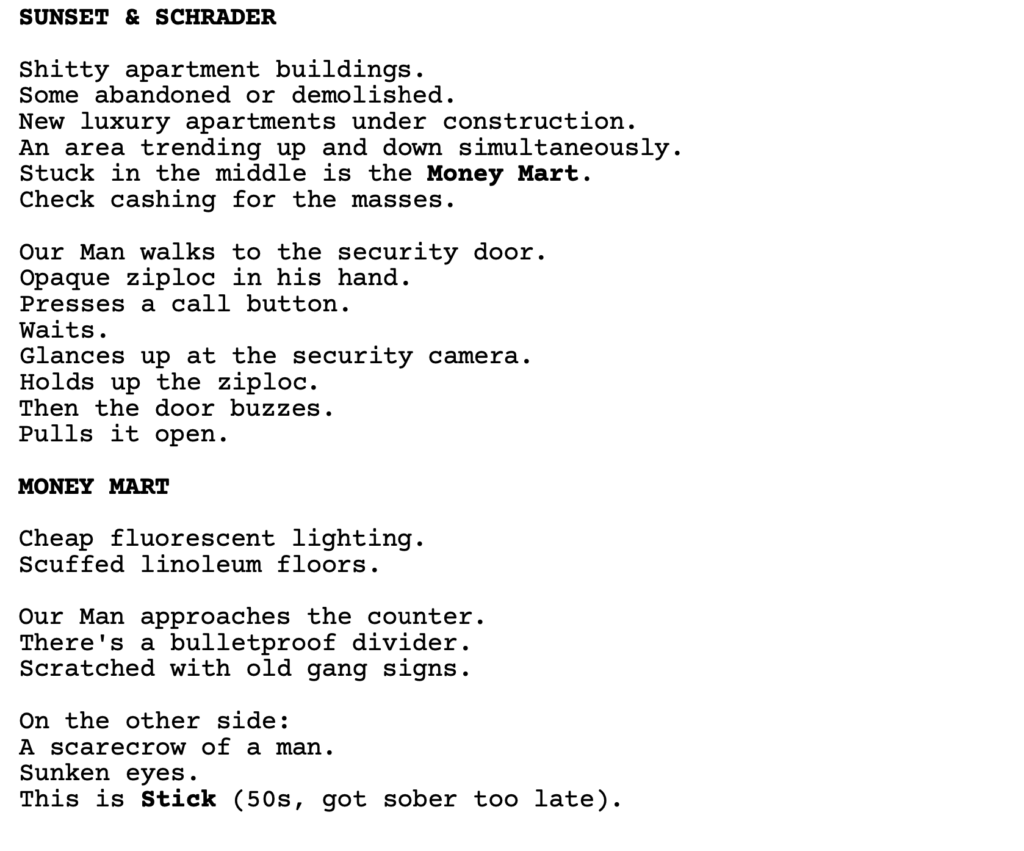 As for the story, I was on the fence for a while.
As for the story, I was on the fence for a while.
I should bring this up because I JUST TALKED ABOUT IT in the newsletter and here it is, being done in all its glory, not once but TWICE WITHIN FIVE MINUTES. I mean, I was shocked.
25 pages in, Our Man gets stopped by a cop. The cop is seconds away from discovering that our man just killed a “human.” And then a kid drives by and throws a bag of urine at the cop, so the cop jumps in his car to chase him. This is the worst thing you can do as a writer – SAVE YOUR HERO FOR HIM. A hero must save himself. That’s when we fall in love with heroes!
Go watch when the T-1000 shows up to take on the Terminator in T2. You get a 20 minute series of attacks. Not once does James Cameron save the Terminator. The Terminator has to earn every single victory over the T-1000.
So then, less than 2 seconds later, Our Man is walking back to his car and gets surprise-jumped by a dreg. They battle. The dreg has the upper hand. It’s easily about to kill Our Man. And then, what do you know, BLUE LIGHTNING appears from the side. It kills the Dreg. It’s Our Man’s new partner, who came in to save the day!
That is twice – TWICE – that the writer saved the hero.
You’re probably asking, well, wait a minute Carson. If this is so bad, why is the script selling for so much money?
I’ll tell you why. Because it’s better than both Bright and Day Shift.
Something happens to this script when Boxer arrives. Because, before Boxer, this was a cold sad depressing world. She then comes in with this enthusiasm that not only gives Our Man hope – it gives US hope! I loved that she was older, which is a different kind of dynamic than we’re used to with these pairings. I loved that all she wanted to do was be friends with Boxer. And she wouldn’t let him off the friend hook.
And of course, once she wins that battle, we’re a HUGE FAN of them. We now want them to succeed together. What this does is that when they get into trouble, we feel a lot more fear due to our strengthened emotional attachment to the team. This is what screenwriting is all about – it’s mining real emotion from fictional characters. It’s the hardest thing to do in the world and it’s always a minor miracle when it happens. These writers make it happen with that relationship.
Plus you have this mystery with these monsters. What are they? Who’s in charge of them? What do they want? Why are they being asked to kill them? With the vampires in Day Shift, it was all straight forward. With Bright, you had some dumb super-fairy that we didn’t care about. The things in this script genuinely have you curious what the bigger mystery is and that keeps you turning the pages.
I even got used to the annoying writing style after a while. Very curious to see what David Sandberg does with this. I hope the directing style feels different from Bright and Day Shift.
[ ] What the hell did I just read?
[ ] wasn’t for me
[x] worth the read
[ ] impressive
[ ] genius
What I learned: Early on in the screenplay is when you make the impression on the audience of your main character’s defining trait – the thing that’s holding him back in the world. If you don’t make that impression loud and clear, the reader isn’t going to ever know your hero. The mistake a lot of writers make is to be too subtle about this defining trait in the fear of being too “on the nose.” I can’t tell you how many times I’ve given this note and the writer has said, “Yeah but I didn’t want to be on the nose.” When it comes to who your main character is, you want to be clear. And Weidman and Tock take five separate moments in the opening 15 pages to highlight that our hero is ALONE. He’s LONELY. He’s BY HIMSELF. It ingrains in the reader’s head that this it the thing that our hero needs to overcome in this story.
What I learned 2: Give your hero a life goal that’s a little surprising and a little against type. It adds more depth to the character. One of the best creative choices in the script was that this downbeat loner loved karaoke. So much so that his dream was to open a karaoke bar! Something about that choice made Our Man feel real. You could’ve easily done the cliche thing of having his goal be to retire to a small house on a beach in Mexico. But by adding this more unexpected choice, he stands out from all the cliched characters before him.
Genre: Comedy/Action
Premise: A secret CIA spy must save the day when her best friend’s destination wedding is infiltrated by terrorists planning to break into the rich fiancé’s vault and steal all his money.
About: This project will star Rebel Wilson. It will be directed by Simon West. The script comes from Shaina Steinberg. Steinberg has been at this for a while. She has a couple of produced credits from 2011, writing two episodes of the TV show, “Chase.”
Writer: Shaina Steinberg (story by Shaina & Cece Pleasants)
Details: 110 pages
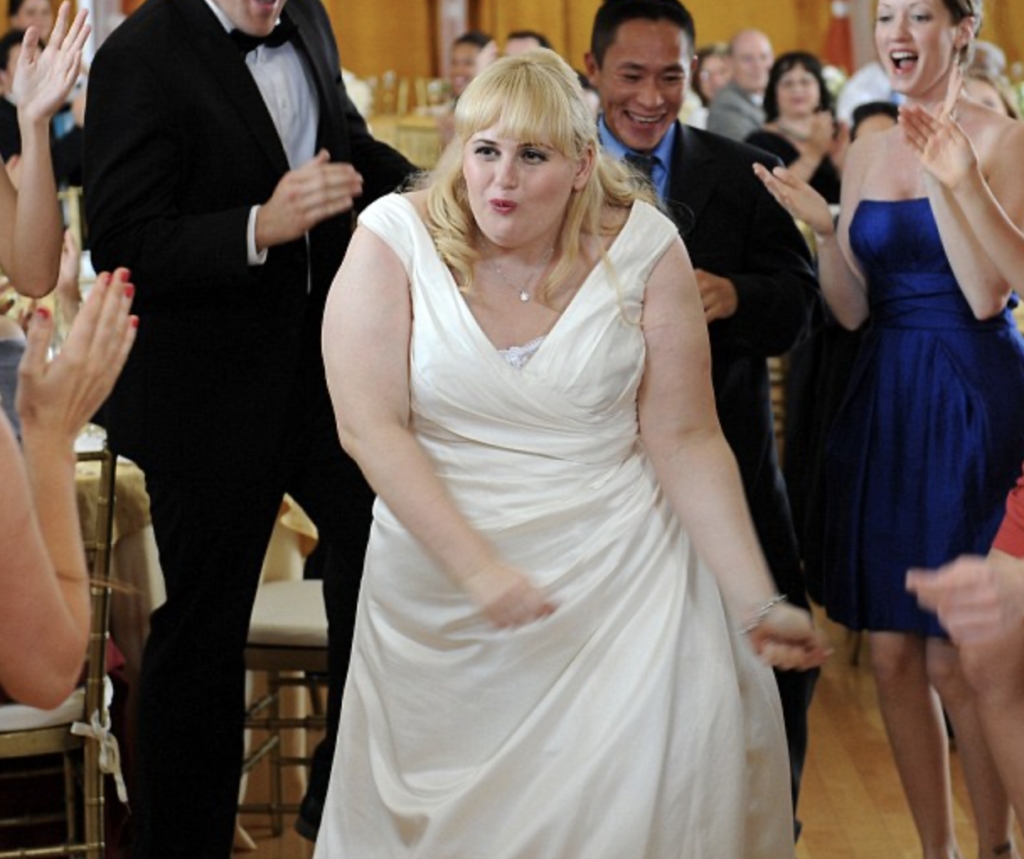
I love these callback concepts to the giant spec sale days. This is the kind of script that would’ve sold for a million dollars back in 1998. It actually reminds me of the famous spec sale, “Monster-In-Law,” which, literally, sold on the title alone.
That’s pure spec script DNA right there, when you can sell a script off its title. It’s also something you can’t do anymore. I mean, yeah, this movie is getting made. But I don’t think it came together as a spec sale.
Sam and Betsy have been best friends since they were children. And both of them have difficult home lives so they promise each other never to get married.
Cut to 20 years later and Betsy is in Barcelona with Sam and several other girls for Betsy’s bachelorette party. Betsy is marrying a really rich guy so the wedding is going to be extravagant.
However, it turns out Sam, who’s now secretly a CIA agent, has a mission here in Spain and her team is able to take down a big terrorist. This means that Sam misses some bachelorette party activities and Betsy is so upset about it that she hands the title of Maid of Honor over to the snobby Vanessa, who accepts it with it a Cruella-like smile.
Although Sam is booted from the wedding, which is taking place on a private island in Malta two weeks later, she shows up anyway. No one seems to be enthusiastic about her presence. They assume she’ll disappear like she always does right when Betsy needs her.
But then, on the first night, some gnarly looking terrorists (or thieves?) swim onto shore and bust into the mansion everybody’s staying at, the family home of Betsy’s rich fiancé. They know about the secret vault in the house that contains millions of dollars and they begin their plan of breaking into it while holding all the wedding guests hostage.
Meanwhile, Sam happens to be off in some back room when this is happening, allowing her to morph into her kick-butt spy persona. From there, it’s off to the races, disposing of these terrorists one by one, until she can get to the big fat baddie, Kurt, and take him out, thus saving the day, as well as her friendship with Betsy.
I don’t know how funny this script is. But it makes up for any of its non-funniness by being such a fun film.
The setup is strong, mainly because of the central relationship, which is more complex than it looks like at first glance.
Normally, you have basic reasons why two friends aren’t friends anymore. Somebody got upset about something a while back and they never talked about it and, therefore, the two friends drifted apart. Or someone’s jealous of someone else, which was the case in Bridesmaids.
Here, Betsy is upset with Sam because Sam is never around when she needs her. We see this right from the start, when she misses an important gathering with all the bridesmaids.
But the reason Sam isn’t around is because she’s a CIA agent and literally trying to save the world. So it’s technically not Sam’s fault that she isn’t around. And because Sam can’t tell Betsy the real reason why she’s absent, their friendship fractures.
I like these complex reasons for broken relationships. There’s more to it, which gets the reader thinking. We’re frustrated cause we wish Betsy could understand that Sam isn’t doing this on purpose. And we’re mad because there’s no way for her to tell her.
Then, when the big terrorists takeover happens, you get the intersection of these two worlds that then exploit this unique relationship issue. Sam gets to utilize the skills of the very job that’s keeping her from Betsy to save her life.
And it’s all done in a package that feels like a fresh reinvention of Die Hard.
I’m actually surprised nobody’s come up with this idea before. Scott? This feels like it’s right up your alley. Of course, maybe people have thought of it, but the script never moved through the system like this one did.
The script’s only weak point is that it’s not funny enough. The only character who gets laughs is Vanessa. She’s so deliciously cruel that we love to watch her operate.
But these other characters aren’t funny. The pregnant character. The slutty character. I’m not saying that these archetypes can’t be funny. But what a lot of writers will do is they’ll include these character types that are funny *in theory,* but then they don’t do the work to actually make them funny.
A character like Alan in The Hangover isn’t just funny because he’s wacky. You can’t just throw a character like him into the mix and the laughs come. You have to think these characters through and understand WHY they’re funny. Where they came from. And how that shapes their comedy.
I tell writers this all the time. You want to know a chracter as specifically as possible. That’s why you do all that annoying stuff like write down a 5 page backstory about your character. Cause the more you know about that person and the life they lived, the more formed they will come off on the page. And if it’s a comedy, I promise you it’ll be easier to find the laughs from them.
And then there just weren’t any clever funny set pieces. There was some entertaining action. But where is the show-stopper laugh-out-loud set piece in Bride Hard? Die Hard is famous for all its cool set piece moments. If you’re going to use that template, your job is to write a bunch of funny action set pieces. That part of the script just wasn’t there, though. Not enough, at least.
Finally, I would’ve liked to feel more fear here. I never, for a second, felt like the guests were in real danger. The bad guys aren’t that bad. The one guest who gets shot – the husband-to-be – it happens as an accident. The bad guys just want their money and for these annoying wedding guests to shut up while they get it.
I understand that it’s tricky with comedy. If you go too over the top with danger, it’s not funny anymore. But if it doesn’t feel like there’s any danger at all, we’re not really invested in the story. Remember that laughing is a release of tension. Where does that tension come from? It comes from the fear that these terrorists are going to kill these people. If that’s not there, there’s no tension to release. Which means no laughs.
Despite that, this is worth a read. It’s one of those situations where the concept is too good to screw up. Which is a great reminder of how important concept is. It does a massive amount of the work for you.
[ ] What the hell did I just read?
[ ] wasn’t for me
[x] worth the read
[ ] impressive
[ ] genius
What I learned: To make any relationship interesting, introduce a problematic element that’s hurting that relationship and that one of the characters CANNOT TELL THE OTHER CHARACTER about under any circumstances. In this case, it’s that Sam is a spy. But it could be anything. This secret creates a compelling dynamic because the audience is always frustrated by the fact that, if this piece of information was known, the friends, or the couple, would immediately resolve their issues. Because that’s not an option, the reader becomes even more invested cause they want to see how this unresolvable situation is going to be resolved.

